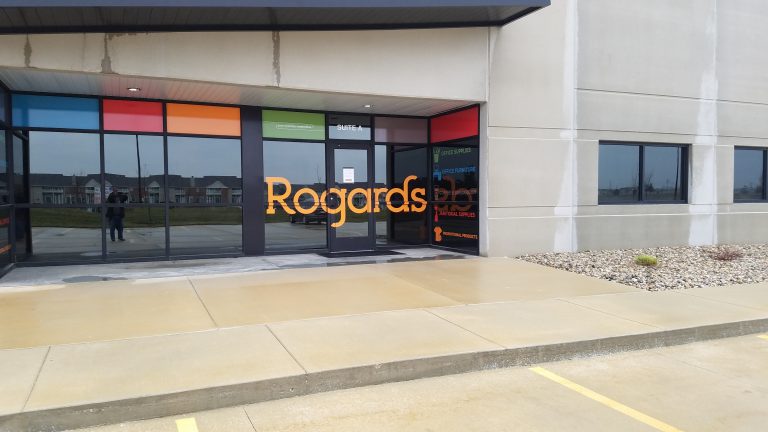One of the first things Rogards did in response to the coronavirus outbreak was to suspend its trial chair program.
Rogards president and CEO Tonya Horn says the program is popular among customers of the Champaign office supply business, which traces its beginnings to 1906. Customers could take an office chair back to their own office to test it out before deciding whether to buy it. But Horn said that didn’t seem like a good idea in the wake of a pandemic.
“We just didn’t feel like there was a good way to keep sending chairs out into other places and make sure they were disinfected and cleaned when they went to our customer, and then make sure they were disinfected and cleaned when they came back home from us,” said Horn.
Rogards is just one of the businesses in the Champaign-Urbana area that have had to adjust quickly to the coronavirus outbreak, and the restrictions imposed to slow down the spread of COVID-19.
Adjustments For A Century-Old Company
While Rogards has suspended its trial chair program, it also faced more restrictions, after Governor JB Pritkzer’s Stay-At-Home order took effect Saturday evening, March 21.
Most of Rogards’ 15-person work force is now working from home. But because many of their customers are considered essential under the governor’s order, Rogards is considered an essential business as well. Horn says that’s allowed them to keep two people at their building in Champaign’s northwest commercial district. Rogards has also continued sending out their own crew to deliver to customers. Only now, Horn says those crews carry plenty of hand sanitizer, and practice “no-contact” delivery techniques.
“You know, pretty much dropping things off at a front desk or in a foyer or at a delivery dock, things like that,” said Horn. “A lot of times we do some pretty extensive inside delivery. So we’ve cut back on that for right now.”
And Horn says since many more people are now working from home, more of their deliveries now go to homes instead of offices. She says if the current restrictions continue for more than a month or six weeks, many small businesses like hers will be in trouble. If that happens, she’s hoping for help from the government, in the form of grants, loans or payroll tax deductions.
The Accounting Firm
The accounting firm of Martin Hood LLC is also considered an essential business by the state. So it’s been allowed to keep some employees at its offices in Champaign. But audit partner Denise Hood says most of the firm’s 60 employees are now working at home (Hood says about seven had been telecommuting before the coronavirus outbreak occurred).
Hood says the transition to working at home has been fairly smooth. But she notes that many employees must cope with shaky internet connections, and a shortage of comfortable office chairs at home offices.
“And to be honest, I feel bad for the families that are working from home that have young kids,” said Martin.
This is tax season, a busy time for Martin Hood, even if tax filing deadlines have been moved three months ahead to mid-July. In addition to that, Martin says they’re receiving a lot of calls from clients struggling to adjust to the pressures of the coronavirus outbreak and the forced shutdowns of many businesses.
“I think the very awesome part about is most of the calls are how am I going to protect my employees?” said Martin, who says her firm is spending a lot of time helping clients navigate laws for family medical leave and small business loans.
But Martin says she misses sharing an office with her co-workers.
“In our business, you might have a question and it’s easy just to shout out to the person next to you, but now you have to actually make an effort,” said Martin.
The Fitness Studio
Unlike Rogards and Martin Hood, Kinex Fitness Studios is not considered an essential business under the governor’s Stay-At-Home order. The personal training it offers to clients, ranging from young athletes to octogenarians, is impossible under the restrictions of social distancing.
But even though their doors are closed, Kinex trainer and general manager Lance Lyell says they’ve found a way to work with their customers anyway. In the past, Kinex trainers had sometimes used apps like FaceTime and Zoom to work with clients who were traveling. Now, Lyell says their staff is conducting all personal training sessions virtually.
“Our trainers are probably at about 60% of what they would normally train,” said Lyell. “But since we’re giving them 100% commission, they’re basically earning the same amount of money at home during the shutdown, as they would if they were here full-time.”
Lyell says allowing trainers to keep the entire fee – instead of splitting it with the studio — helps them weather the loss of business. But it means the fitness studio itself is receiving no revenue at all during the Stay-At-Home period. Lyell says Kinex’ Texas-based owner can weather the loss, but only for a few months.
Champaign County Chamber of Commerce President and CEO Laura Weis points to Rogards, Martin Hood and Kinex as examples of how local businesses are coping with the restrictions imposed in response to the coronavirus outbreak. She says the Chamber’s staff is also working from home during the Stay-At-Home period. And she wonders if the experience might have a lasting impact on business practices.
“What will be interesting when this is all is said and done is, now that so many companies have adapted, what does it look like, when you realize that you have that ability?” asked Weis, referring to the ability to work from home. She thinks the increased use of telecommuting might lead to employers hiring work-at-home employees, no matter how distant, if they can provide a special skill set.
(NOTE: This article was updated on 3/26/20 to include material about Martin Hood LLC. – JM

